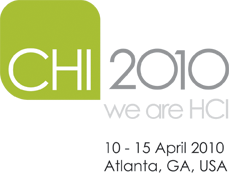| Contact: | Rosemary W. Stevens CHI 2010 Press Coordinator Ace Public Relations, Palo Alto +1 (650) 494-2800 acepublicrelations@gmail.com |
For Immediate Release:
Impact of Data and Design Confluence Examined at
ACM Computer-Human Interaction Conference
ATLANTA, GA (April 12, 2010) - With digital data surrounding us and information in the palm of our hands, the possible applications and consequences of our information world are critical. ACM's Computer Human Interaction (CHI) conference (www.chi2010.org) will address these issues with interactive demonstrations, discussions and performances April 12-15 at the Hyatt Regency Atlanta, in Atlanta, Georgia, USA.
Here is a glimpse of some key presentations:
Interactive Learning with the Simon Robot
A surge of interest in having robots leave the labs and factory floors to help solve critical issues from eldercare to education faces many problems. Before general purpose robots can function in social, dynamic human environments, a critical issue to be solved is the inability to pre-program robots with every skill they need. Robots will instead need to interact with people and their environment, and to learn new things on the job. Research presented at CHI 2010 is designed to enable robots to learn new tasks and skills by demonstration from everyday people who are not experts in Machine Learning or Robotics.
The Emoti-Chair: An Interactive Tactile Music Exhibit
The Emoti-Chair is a sensory substitution system that brings a high-resolution audio-tactile version of music to the body to improve music accessibility for deaf or hearing-challenged people. It offers the chance to experience sounds as tactile sensations through a model human cochlea (MHC), which drives the Emoti-Chair. Research at CHI 2010 will demonstrate a system that uses eight audio-tactile channels to help people experience a broad range of musical elements as physical vibrations.
Pachube Design Activity - a Design Activity with Many Hands
Invited CHI 2010 presenter Usman Haque examines the complexities of ubiquitous information and the role of design while leading his Pachube design activity. The Pachube platform enables participants to store, share, and discover realtime sensor, energy and environment data from objects, devices and buildings around the world. It facilitates interaction between remote environments, both physical and virtual.
Visible and Controllable RFID Tags
Radio frequency identification (RFID) tags containing privacy-sensitive information are increasingly embedded in personal documents such as passports and driver's licenses. But people are often unaware of the security and privacy risks associated with this technology, as it remains largely beyond individual control. Researchers at CHI 2010 have developed a collection of novel yet simple, inexpensive alternative tag designs to make RFID visible and controllable.
For a complete schedule of interactive events, consult: http://www.chi2010.org/attending/media.html
The annual conference on Computer-Human Interaction (www.chi2010.org) is the premier worldwide forum for exchanging information on all aspects of how people interact with computers. CHI 2010 is April 10-15, in Atlanta at the Hyatt Regency Atlanta. It offers two days of pre-conference workshops and four days of dynamic sessions that explore the future of computer-human interaction with researchers, practitioners, educators and students.
More than 2000 professionals from over 40 countries are expected at this year’s conference, which marks 28 years of research, innovation and development of the Computer-Human Interaction community. CHI 2010 is sponsored by the ACM Special Interest Group on Computer Human Interaction (SIGCHI). Organizations contributing to the financial support of the conference include Google, Inc.; Microsoft Corp.; the National Science Foundation (NSF), and Yahoo! Inc.
About SIGCHI
The ACM Special Interest Group on Computer-Human Interaction (www.sigchi.org) is the world’s largest association of professionals in the research and practice of computer-human interaction. SIGCHI serves as a forum for ideas on how people communicate and interact with computer systems. This interdisciplinary group of computer scientists, software engineers, psychologists, interaction designers, graphic designers, sociologists, and anthropologists is committed to designing useful, usable technology which has the potential to transform individual lives. SIGCHI has more than 60 local chapters for HCI professionals across five continents, publishes the SIGCHI Bulletin quarterly, and co-sponsors conferences and workshops to advance the field of computer-human interaction.
About ACM
ACM, the Association for Computing Machinery (www.acm.org), is the world’s largest educational and scientific computing society, uniting computing educators, researchers and professionals to inspire dialogue, share resources and address the field’s challenges. ACM strengthens the computing profession’s collective voice through strong leadership, promotion of the highest standards, and recognition of technical excellence. ACM supports the professional growth of its members by providing opportunities for life-long learning, career development, and professional networking.



